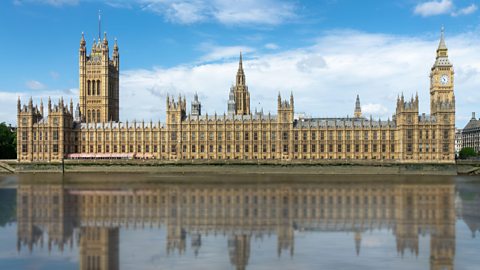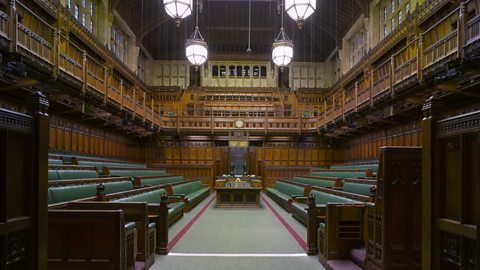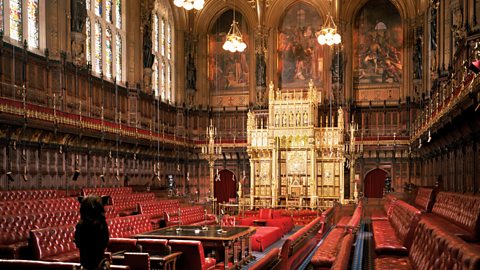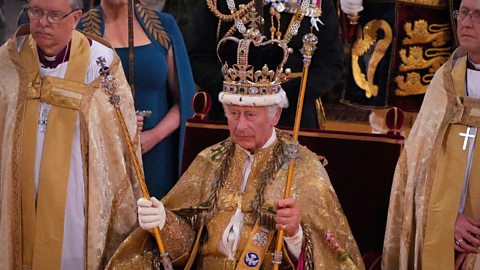Democracy and the UK Parliament
The United Kingdom (UK) is a democracyA type of government where people govern themselves or elect representatives to govern for them.. In the UK there are too many people to all discuss all the decisions about how the country is run. Therefore representativeSomeone who acts on the behalf of another person, or group of people, eg a politician who is elected to represent voters. are elected to make decisions.
Representatives include Members of Parliament (MPs), Members of the Scottish Parliament (MSPs) and local councillors.

Video - The UK Parliament
Watch this video explaining what the UK Parliament is and what MPs and Lords do.
The UK Parliament.
What are the different parts of the UK Parliament?
The UK Parliament meets in Westminster, London. It has three parts:
- The House of Commons - Debate proposals and make laws
- The House of Lords - Check proposed laws, make amendments
- The Crown - The Monarchy, Head of State, approves laws
The House of Commons
The UK is divided into 650 constituencies or areas. Each constituency elects one MP to represent constituents in the House of Commons.

Image caption, The House of Commons chamber
Image caption, MPs are elected to represent their constituents. They do this by debating and asking questions in the House of Commons. (PA Images / Alamy Stock Photo)
1 of 2
What is the role of MPs in the UK Parliament?
One role of MPs in the UK Parliament is to represent their constituents in areas where the UK Parliament takes decisions eg immigration or defence. MPs either debate or ask questions in the House of Commons or they work in smaller groups known as committees.
Other important roles of MPs in Parliament are to help make laws and to scrutinise (check-up on) the work of the government or investigate issues.
The House of Lords
The House of Lords is the second chamber of the UK Parliament. The role of the House of Lords is to help make laws as well as check on the work of government and investigate issues.

Image caption, The House of Lords chamber (robertharding / Alamy Stock Photo)
Image caption, Peers are appointed in recognition of their expertise in a particular area. They scrutinise bills and the work of the government. (PA Images / Alamy Stock Photo)
1 of 2
Who appoints peers?
Most peers have been appointed by the monarch on the advice of a prime minister in recognition of their expertise in a particular area eg business, law or science. Others are Church of England bishops and 92 are hereditary peers or people with titles (such as Barons or Viscounts) who have inherited the right to sit in the Lords.
The Crown
The UK's political system can be described as a constitutional monarchy with the monarch as Head of State.
However, it is the Houses of Parliament that make our laws, not the monarch.

Image caption, King Charles III, the UK's current monarch. (PA Images / Alamy Stock Photo)
Image caption, Every year the monarch goes to the House of Lords to open a new session of Parliament. (PA Images / Alamy Stock Photo)
1 of 2
When a Parliamentary Bill is given Royal Assent it becomes an Act of Parliament. It is then up to the relevant government department to implement that law. For example, the Transport department will deal with new Acts relating to transport.
The monarch must remain politically neutral and does not interfere with the legislative process. The monarch gives Royal Assent which is a mere formality. A monarch has not given assent in person for over 150 years and has not withheld it for over 300 years.
Every year the monarch goes to the House of Lords to open a new session of Parliament. The monarch reads out a speech that announces what the government plans to do in the coming year. The speech is written by the Prime Minister.
Video ÔÇô Passing legislation
Watch this video to find out more how laws are created.
Passing legislation